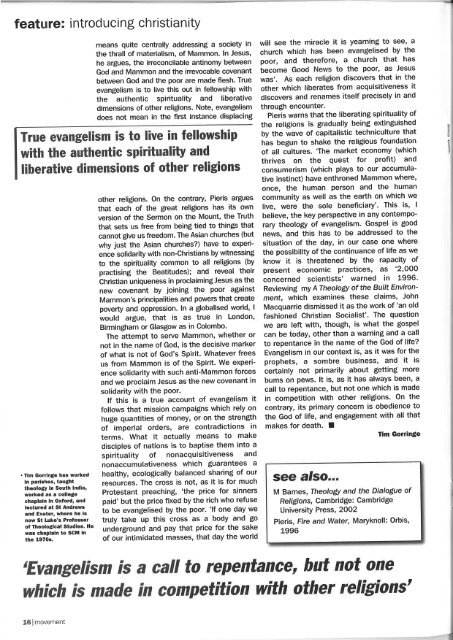Movement 113
You also want an ePaper? Increase the reach of your titles
YUMPU automatically turns print PDFs into web optimized ePapers that Google loves.
feature: introduci ng christianity<br />
means quite centrally addressing a society in<br />
the thrall of materialism, of Mammon. ln Jesus'<br />
he argues, the irreconcilable antinomy between<br />
God and Mammon and the irrevocable covenant<br />
between God and the poor are made flesh. True<br />
evangelism is to live this out in fellowship with<br />
the authentic spirituality and liberative<br />
dimensions of other reli$ons. Note, evangelism<br />
does not mean in the first instance displacing<br />
True evangelism is to live in fellowship<br />
with the authentic spirituality and<br />
liberative dimensions of other religions<br />
. Tim GorrinEle has wotked<br />
in parishos' taught<br />
theology in south lndia'<br />
worked a3 a college<br />
chaplain ln Oxfold' and<br />
lectuled at St Andrewg<br />
and Exeter, where he is<br />
now St Luke's Plofeseor<br />
of Thoological Studies. He<br />
was chaptain to SCM ln<br />
the 1970s.<br />
other reli$ons. On the contrary, Pieris argues<br />
that each of the great reli$ons has its own<br />
version of the Sermon on the Mount, the Truth<br />
that sets us free from being tied to things that<br />
cannot $ve us freedom. The Asian churches (but<br />
why just the Asian churches?) have to experience<br />
solidarity with non-Christians by witnessing<br />
to the spirituality common to all reli$ons (by<br />
practising the Beatitudes); and reveal their<br />
Christian uniqueness in proclaimingJesus as the<br />
new covenant by joinin$ the poor against<br />
Mammon's principalities and powers that create<br />
poverty and oppression. ln a $obalised world, I<br />
would argue, that is as true in London,<br />
Birmingham or Glasgow as in Colombo'<br />
The attempt to serve Mammon, whether or<br />
not in the name of God, is the decisive marker<br />
of what is not of God's Spirit. Whatever frees<br />
us from Mammon is of the Spirit. We experience<br />
solidarity with such anti-Mammon forces<br />
and we proclaim Jesus as the new covenant in<br />
solidarity with the Poor.<br />
lf this is a true account of evangelism it<br />
follows that mission campai$ns which rely on<br />
huSe quantities of money, or on the strength<br />
of imperial orders, are confiadictions in<br />
terms. What it actually means to make<br />
disciples of nations is to baptise them into a<br />
spirituality of nonacquisitiveness and<br />
nonaccumulativeness which guarantees a<br />
healthy, ecologically balanced sharing of our<br />
resources. The cross is not, as it is for much<br />
Protestant preaching, 'the price for sinners<br />
paid' but the price fixed by the rich who refuse<br />
to be evangelised by the poor. 'lf one day we<br />
truly take up this cross as a body and go<br />
underground and pay that price for the sake<br />
of our intimidated masses, that day the world<br />
will see the miracle it is yearning to see' a<br />
church which has been evangelised by the<br />
poor, and therefore, a church that has<br />
become Good News to the poor, as Jesus<br />
was'. As each religion discovers that in the<br />
other which liberates from acquisitiveness it<br />
discovers and renames itself precisely in and<br />
through encounter.<br />
Pieris warns that the liberating spirituality of<br />
the religions is gradually being extinguished<br />
by the wave of capitalistic techniculture that<br />
has begun to shake the relisious foundation<br />
of all cultures. 'The market economy (which<br />
thrives on the quest for profit) and<br />
consumerism (which plays to our accumulative<br />
instinct) have enthroned Mammon where,<br />
once, the human Person and the human<br />
community as well as the earth on which we<br />
live, were the sole beneficiary'. This is, I<br />
believe, the key perspective in any contemporary<br />
theoloSl of evangelism. Gospel is good<br />
news, and this has to be addressed to the<br />
situation of the day, in our case one where<br />
the possibility of the continuance of life as we<br />
know it is threatened by the rapacity of<br />
present economic practices, as '2,000<br />
concerned scientists' warned in 1996.<br />
Reviewing my ATheologr of the Built Environ'<br />
rnent, which examines these claims, John<br />
Macquarrie dismissed it as the work of 'an old<br />
fashioned Christian Socialist'. The question<br />
we are left with, though, is what the gospel<br />
can be today, other than a warning and a call<br />
to repentance in the name of the God of life?<br />
Evangelism in our context is, as it was for the<br />
prophets, a sombre business, and it is<br />
certainly not primarily about getting more<br />
bums on pews. lt is, as it has always been, a<br />
callto repentance, but not one which is made<br />
in competition with other religions. On the<br />
contrary, its primary concern is obedience to<br />
the God of life, and engagement with all that<br />
makes for death. I<br />
Tim Gorrin$e<br />
see also,,,<br />
M Barnes, Theolo$y and the Dialo$ue of<br />
Retigions, Cambrid$e: Cambrid$e<br />
University Press, 2002<br />
Pieris, Fire and Water, Maryknoll: Orbis'<br />
1996<br />
'Evangelism is a call to repentanGe, hut not one<br />
which is made in competition with other religions'<br />
16 lmovement

















